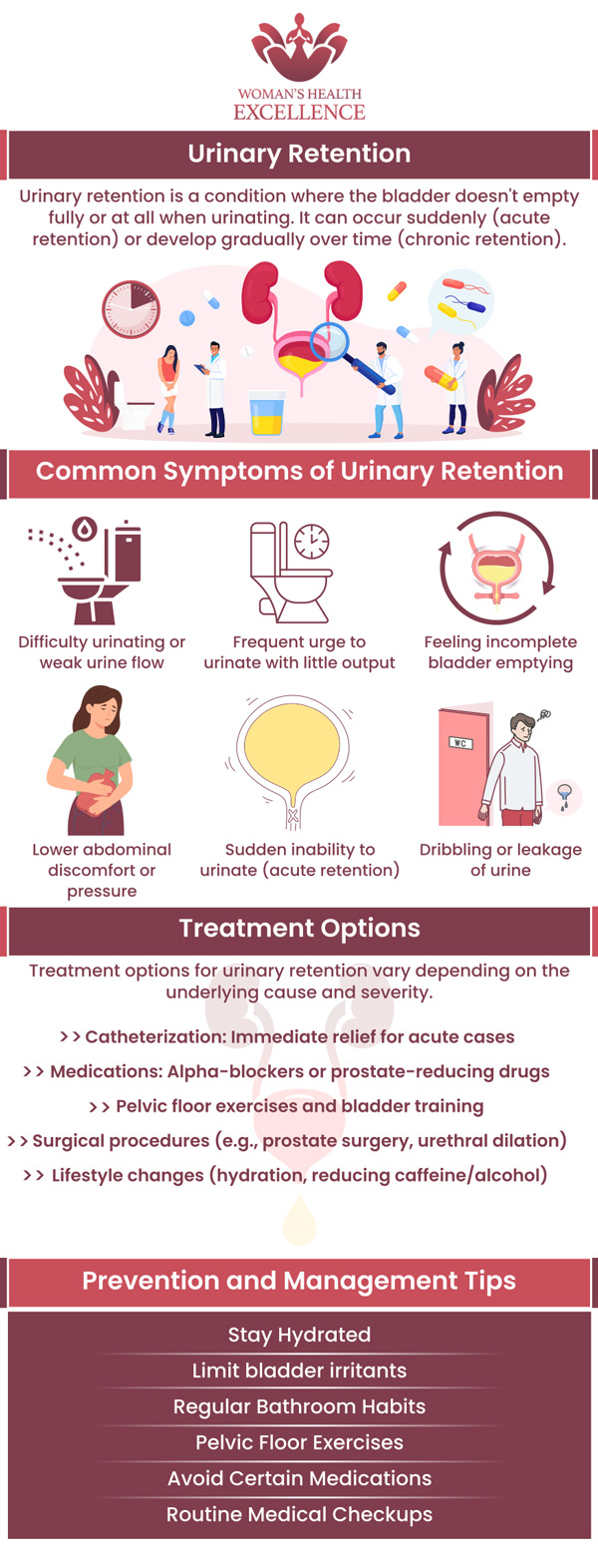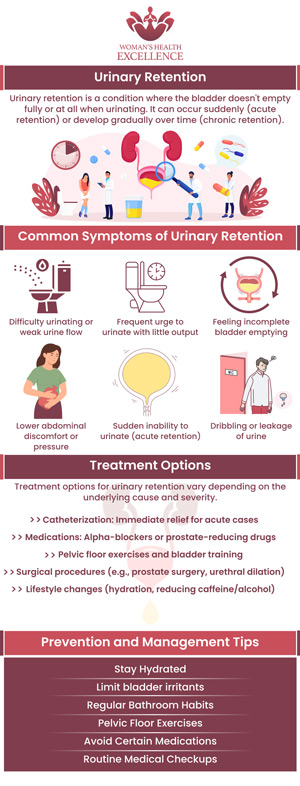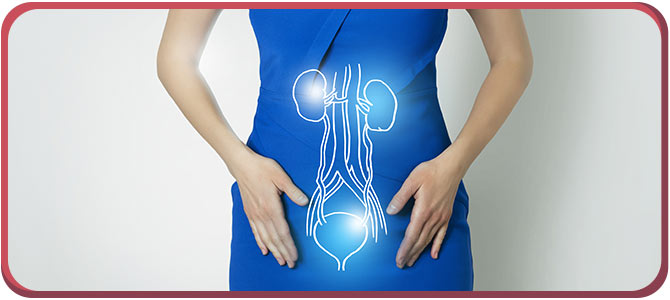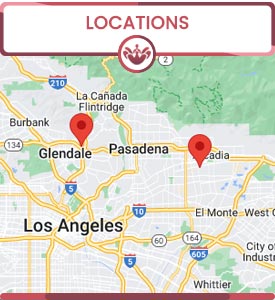What Does a Urinary Retention Treatment Specialist Do?
There are a number of concerns that can affect the health of the urinary system, including urinary tract infections and urinary retention. Take help from our urinary retention treatment specialist, Dr. Prema Kothandaraman now. For more information, contact us today or book an appointment online. We have convenient locations to serve you in Arcadia, and Glendale, CA.




Table of Contents:
What is urinary retention?
What causes urinary retention?
What are the signs of Urinary Retention?
At what age can Urinary Retention start?
The urinary system consists of the kidneys, bladder, urethra, and ureters, otherwise known as the urinary tract. This system is responsible for the transportation, processing, and elimination of urine through and from the body. While these problems are more common in the elderly, they can affect people of all ages, especially those with multiple risk factors.
Urinary retention is a condition where the bladder is unable to empty fully. It can be temporary or permanent and is usually not a serious medical condition. However, it can lead to certain complications if left unaddressed, such as an increased likelihood for urinary tract infections, kidney and bladder stones, and problems with the kidneys and bladder.
Urinary retention can be a symptom of aging or a symptom of an underlying medical condition; it may also be caused by a medical procedure, including surgery or radiation, or by an injury. Urinary retention may affect a person of any age, including children, although it is much more common in the older population. It can cause problems with passing urine, with urination being painful or difficult, and lead to infection or incontinence.
The causes of urinary retention are related to either the bladder not being able to maintain a strong enough force to expel all the urine or a blockage that partially or fully prevents urine from leaving the bladder or urethra.
• Blockage or Narrowing in the Urethra or Bladder Neck — In order to urinate normally, all parts of the urinary tract need to work together, and in the correct order. Urine normally flows from the kidneys, through the ureters to the bladder, and out the urethra; if a blockage or narrowing occurs somewhere along the urinary tract, there may be difficulty urinating. If the blockage is severe, it may prevent urination altogether.
Conditions that can cause this include:
• Enlarged prostate, or benign prostatic hyperplasia
• Bladder outlet obstruction, such as:
• Urethral stricture
• Scar tissue in the bladder neck
• Pelvic organ prolapse, including:
• Cystocele
• Rectocele
• Urinary tract stones also called calculi
• Constipation
• Pelvic masses, such as:
• Noncancerous or cancerous tumors
• Fibroids
• Polyps
• Clots
• Tight pelvic floor muscles
• Infections, such as:
• Urinary tract infection
• Sexually transmitted diseases
• Prostatitis
• Trauma to the pelvis, urethra, or penis
• Inefficient Bladder Contraction (Underactive Bladder) — Urinary retention may develop when the bladder muscles are not able to contract with enough strength or do not contract long enough to empty the bladder completely; this is also known as the underactive bladder. Causes of the underactive bladder include:
• Neurological problems, such as:
• Parkinson’s disease
• multiple sclerosis
• Alzheimer’s disease
• Stroke
• Birth defects, such as spina bifida
• Diabetes
• Spinal cord injury
• Traumatic brain injury
• Pelvic injury
• Vaginal health
• Guillain-Barré syndrome
• Fowler’s syndrome
• Heavy metal poisoning
• Medicines, including:
• Alpha-adrenergic agonists
• Anticholinergics and antispasmodics
• Antidepressants
• Antihistamines and decongestants
• Antiparkinsonian medications
• Antipsychotics
• Benzodiazepines
• Calcium channel blockers
• Nonsteroidal anti-inflammatory drugs
• Opioids
• Serotonin and noradrenaline reuptake inhibitors
• Surgery
• Weak bladder muscles, caused by:
• Age-related loss of bladder muscle strength
• Overdistention (stretched and damaged bladder muscles)
• Pregnancy and childbirth
• Trauma
The signs of urinary retention may include:
• the inability to urinate
• the urgent need to urinate
• swelling of the lower abdomen
• inability to completely empty bladder when urinating
• frequent urination in small amounts
• difficulty starting the flow of urine
• a slow urine stream
• leaking urine without any warning or urge
• lower abdominal pain or discomfort
Urinary retention can start at any age, although older age can increase the risk of urinary retention. Urinary retention is also more common in men than it is in women, especially over the age of 70. If you are experiencing urinary retention, trust the professionals at The OB-Gyn and Incontinence Center to provide a higher level of care. Call us today to book an appointment for urinary retention treatment. For more information, call us today or book an appointment online. We have convenient locations to serve you. We serve patients from Arcadia CA, Glendale CA, Monrovia CA, Pasadena CA, Los Angeles CA, Burbank CA, and surrounding areas.


Additional Services You May Need
▸ Urogynecology
▸ Minimally Invasive Gynecology
▸ Monalisa & Medical Aesthetics
▸ Bioidentical Hormone Replacement Therapy
▸ Urinary Incontinence
▸ Pelvic Organ Prolapse
▸ Painful Bladder
▸ Urinary Tract Infection
▸ Genitourinary Syndrome of Menopause
▸ Female Sexual Dysfunction
▸ Urinary Retention
▸ Vaginal Laxity & Prolapse
▸ Postpartum Pelvic Floor Problems
▸ PCOD
▸ Bladder Prolapse Repair
▸ Urgent PC
▸ Fibroids
▸ Excessive Bleeding
▸ Pelvic Pain
▸ Birth Control & IUD
▸ Vaginal & Pelvic Infection
▸ Monalisa Touch
▸ STD
▸ TempsureVitalia
▸ Biote Pellet Therapy
▸ Topical BHRT
▸ Flexsure
▸ Rectal Prolapse Repair
▸ Tempsure ENVI
▸ Minimally Invasive Pelvic Surgery for Incontinence



